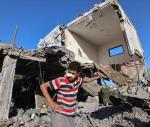You are here
Regional water cooperation as a driver for peace
Jan 10,2015 - Last updated at Jan 10,2015
The third Arab Water Week, slated to start today at the Dead Sea in Jordan, with a focus on innovative and sustainable solutions for the water sector in the Arab region.
Sweden strongly supports efforts to improve regional cooperation in the Middle East and North Africa in order to achieve sustainable and equitable water solutions.
Through our regional development cooperation, Sweden supports regional water initiatives, of which Jordan is a partner, with about $10 million on an annual basis.
Our support goes to initiatives that promote regional solutions, for example: The Arab Countries Water Utilities Association (ACWUA) on water utility management, drawing on best practices from the region; the United Nations Economic and Social Commission for Western Asia’s (UNESCWA) programme on climate change and water knowledge development and on Millennium Development Goals (MDG) standardisation; and EcoPeace Middle East “Good Water Neighbours” programme, focusing on water as a source of cooperation in the Jordan River Basin.
For Jordan, the massive influx of refugees has added to the water challenges.
There is less freshwater available per capita and increased pressure on wastewater treatment plants.
It is a well-known fact to all Jordanians that freshwater resources in the Jordan River basin are among the lowest in the world. Also, most of the water resources in the sub-region are shared.
Ideally, the Jordan River basin should be jointly managed by Jordan, Israel, Lebanon, Palestine and Syria. However, the political realities on the ground today are putting limitations on such cooperation.
The population growth, the ongoing conflict between Israel and Palestine, as well as the civil war in Syria put pressure on scarce water resources.
The recent war in Gaza worsened the water situation and the breakdown of its wastewater treatment facilities has increased the risk for waterborne diseases.
Sweden has, for many years now, been consistent in its support both for reinforced regional cooperation and for the rehabilitation of the Jordan River itself.
One key factor behind our support is that we firmly believe that more cooperation on shared water resources could be an important driver for peace in this region.
In order to achieve this goal, states need to interact, negotiate and ultimately agree on water sharing principles and procedures on equal terms.
The absence of a sustainable peace agreement between Palestine and Israel is a case in point.
Palestinians have not been able to adequately develop their water sector during the last decades. As a consequence, Palestinians have to buy most of their freshwater, spending about twice the internationally accepted norm.
One of the reasons behind the recent decision by the Swedish government to recognise the state of Palestine is that we believe negotiations on a final peace agreement should be made less unequal.
The present inequalities between the parties are evident in many areas, not least in the water sector.
I am under no illusion that the Swedish recognition of Palestine will drastically change the water situation in the region. But it is our belief that it can strengthen Palestinian moderate forces and allow for negotiations on a more equal footing.
A future peace agreement should include clear definitions of Palestinian water rights, as well as more appropriate structures for the joint management of water resources.
In this regard, I think important lessons can be learned from the peace treaty between Israel and Jordan. This bilateral peace deal includes detailed arrangements on water and has proved its value over the last two decades.
I have seen with my own eyes how the Jordan River has become a trickle in comparison with its former grandeur. The precious Dead Sea is quickly reaching a critical point of damage from a lack of fresh water input from the lower Jordan River.
Sweden supports efforts to address this situation, but the responsibility lies with the states concerned.
In spite of the conflicts over water, EcoPeace Middle East has shown that trilateral cooperation across borders is possible. This brings some hope for the future.
It is clear that regional problems such as water and climate change know no borders and are best tackled through a regional approach.
A strong Palestine that can negotiate and cooperate with its neighbours is important in this regard.
This is what Sweden wants to contribute to through its recognition of Palestine, as well as through its development cooperation with the region.
Innovation and sustainable solutions require equal partnerships.
Jordan, Israel and Palestine are co-dependent on the water resources in Jordan River basin. All should have the right to safe, adequate and affordable water for all their citizens.
The writer is ambassador of Sweden to Jordan. She contributed this article to The Jordan Times.













